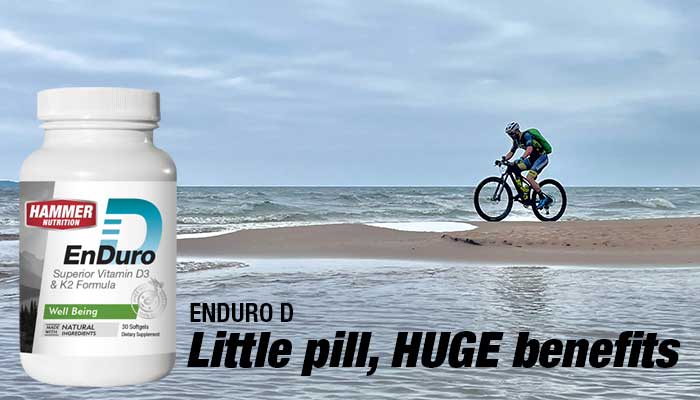What’s your MCPH?
BY BRIAN FRANK
Hey, Hammer fans!
Brian Frank here talking about a really important subject. “Got to get this off my chest before I explode," as the old headline used to read. For 36 years, I've been dealing with the question of how many calories per hour one should consume when exercising, be it an hour, 3 hours, 6 hours, or 12-hour multi-day events. Hint – Less is BEST!
Hammer on.
This question vexes many athletes, and unfortunately, there is so much myth and misinformation surrounding it. The high-calorie crowd, as we call them, the experts of the day, were saying the same thing about how many calories per hour, with some going as high as 400, even 600! Silliness!
Maybe that's what you're burning. Doesn't really matter. You can't consume anywhere near that much. So, now we have a whole new generation of research, sort of. The outcome of a couple of questionable studies touting 60 to 90 grams an hour of carbohydrate is the basis for the "new" 60-90 grams per hour or recommended intake. Take a closer look at that research - Test subjects operate at 50% of max watts! What?
That's right. Participants are walking along at a 95 beats per minute heart rate, not so much. We're constantly exercising at a much higher heart rate than that.
You've probably tried higher calorie intake and had GI distress, plus all kinds of fun problems that go with it. So we invented this concept that less is best for optimal fueling in response to constantly dealing with athletes suffering from overconsumption of calories. So I have a little system I call the minimum calories per hour - MCPH.
MCPH is the number you want to know. You want to determine your minimum calories per hour that allows you to exercise at the limits of your ability and fitness, not slow down, and not suffer GI distress or any other cramping problems. It comes down to about one calorie per pound of body weight for most athletes.
That usually ends up being the sweet spot, plus or minus a few. So, for most athletes, we're talking 100 to 180 calories an hour. Nowhere near this 240 to 360 calorie craziness we're hearing. This high-calorie take also contradicts human physiology. We know that the human liver can return about 1 gram of carbohydrate per minute into Glycogen.
So there you go. Four calories per gram, times 60 minutes in an hour, equals a 240-calorie per hour theoretical ceiling. So why try to exceed that? And more to the point, why try to stuff so many calories down your throat when you just want to go pedal, swim, bike, run, whatever?
So do that and consume a lot less calories. You'll be happier, your stomach will be happier, and you can forget about all the high-calorie fuss and mus. So less is best. 100-180 calories an hour. One calorie per pound of body weight, and you'll be in the ballpark.











21 comments
OMG! I’m right on your formula of 1 calorie per pound. I’ve been Hammering for 10-12 years now and following Secrets of Success so I got the minimum concept from there. I made some adjustments when 2.0 came out to a rounded scoop per hour. I just looked at the Sustained Energy calories per scoop and that puts me right about my body weight of 127!
———
Hammer Nutrition replied:
Hello Brent, thank you for your feedback and affirmation on this new idea for determining one’s optimum hourly caloric intake during prolonged exercise. Thank you also for your long term support and encouragement, it means the world to me. BDF
I think this might be an exception to the rule but when I raced the tour divide this year, if you’re looking at ~20-25 days of burning somewhere on the order of 9000 calories a day it’s time to start thinking about absolute calorie intake. I ate as much as I possibly could, sometimes I would go out and have 2 chicken fried steak dinners and wash it down with a milkshake. I still ended up 14 lbs down from where I started.
———
Hammer Nutrition replied:
Hi Nick, thank you for your comments, and congrats on you accomplishment – you went right past our offices in Whitefish. The MCPH applies to hourly intake strictly while you are moving. In your case, I would absolutely agree that you should consume as many calories as possible, lot of fat, from the time you stop pedaling until you go to bed. Fast overnight and then start fueling as soon as you start pedaling = ideal. BDF
Dr. FRANK you are my IDOL !!!
———
Hammer Nutrition replied:
Ciao Federico! Grazie mille. il sentimento è reciproco. Spero di fare un giro con te nel tuo carrello da golf o in bicicletta nel 2024!
Thank you for this advice on max calories per hour. I heard the same thing 20 years ago from the “508” champ (bicycle race Pasadena to Death Valley). He said that no matter your size, gender, condition, every human can only digest 240 cph (+/- 5-10% max), so on the 28 hour marathon “508” ride, he had to get the intake just right or suffer. I don’t ride 28 hours straight but even on my 4-5 hour rides, it’s important; it’s so easy to over-eat which just slows me down. Your presentation is spot on and I appreciate the reminder!
Great advice as always! I have been following Hammer guidance and using Hammer products for 20+ years of endurance training and racing. You have never failed me! I have proudly shared your wisdom with dozens of friends who are almost always surprised at the “less is best” concept but all who adopt experience success.
No one backs their products with the experience, knowledge and science like Hammer! Thank you for all you do to educate and deliver superior products and results for your athletes!
———
Hammer Nutrition replied:
Hi Kevin, I’m humbled by your praise and am grateful for your support. BDF